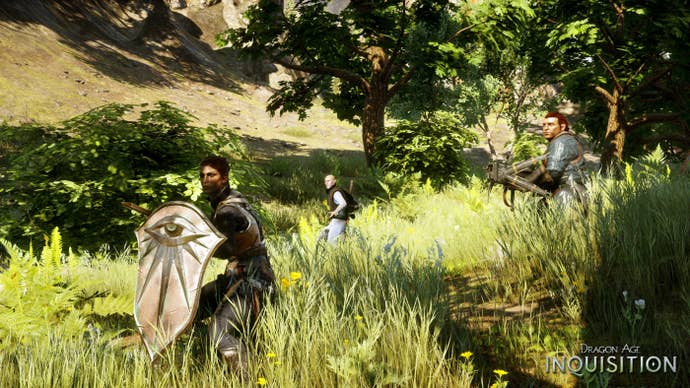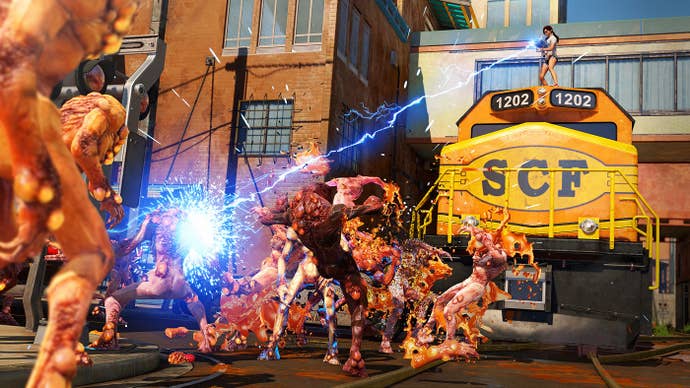Hype Has Deflated: The Effect of Broken AAA Releases
When publishers release broken games, players become less likely to make day-one purchases. Why is this happening?
This article first appeared on USgamer, a partner publication of VG247. Some content, such as this article, has been migrated to VG247 for posterity after USgamer's closure - but it has not been edited or further vetted by the VG247 team.
Two days ago, I wrote about the state of day-one launch events in an age of digital distribution. The responses came in three different flavors:
- I'm older and can't justify that anymore.
- I don't live near a large metro area (or in a primary release country) so I welcome digital availability.
- I don't trust publishers to release non-broken games anymore, so I'm skipping launch day anyways.
It's the latter thought that I want to dig into. Like I wrote in another article, broken releases aren't a new thing, but it does seem like we've had a number of them in the past few months. Games released with missing features or severe game-breaking issues that prevent people from enjoying the product they've purchased.

The issues have been spread across a number of anticipated releases this Fall. DriveClub for PlayStation 4 has had consistent login and online connectivity issues, to the point that Sony has indefinitely delayed the free PlayStation Plus Edition of the title. Players of LittleBigPlanet 3 have reported significant issues with importing their LittleBigPlanet and LittleBigPlanet 2 downloadable content, despite Media Molecule's insistence that it should work.
Grand Theft Auto V had problems with GTA Online character transfers from PS3 to PS4 and Xbox 360 to Xbox One, but Rockstar quickly patched the problem. Halo: The Master Chief Collection shares Driveclub's situation with online connectivity and matchmaking issues, though developer 343 Industries has attempted to address a number of issues in a recent patch. Assassin's Creed Unity has performance issues and a number of graphical glitches that Ubisoft has been slowly fixing. Far Cry 4 had multiplayer issues at launch that have been fixed and PlayStation 3 players are still having issues just playing the game due to Far Cry 3 save data on the same console. World of Warcraft had insanely high queue times when its Warlords of Draenor expansion went live, leading Blizzard to compensate players with free game time.
And that's all before I even get to Sonic Boom.
Bought It, Can't Play It
There have been a number of major releases that valid owners simply couldn't play at launch. Glitches can be overlooked here and there. I acknowledge the launch rush can put online infrastructure under a heavy strain. Even heavy troubleshooting will let some bugs through; millions of passionate players tearing into a game will always find more issues than a dedicated team of Q&A employees working around the clock or reviewers playing under pre-launch conditions.
The problem is all of these faulty launches, one after the other, has caused people to actually be afraid of a day-one purchase. They can't be sure that they'll be able to play a game without issues. Maybe their focus was online play - I'm sure that's true of many Halo: MCC players - so severe online connectivity problems means they paid $60 just to wait. If you're a stickler for graphical performance, Assassin's Creed Unity's below-30fps drops may be a game-breaker for you.

This is compounded by the fact that most major releases can see discounts of $15 to $20 in only a week or two. Why pay the early adopter's tax for the game to sit on your system's hard drive doing nothing? If you can wait even a month, you get to enjoy a cheaper game that hopefully has had all of its issues patched out.
What's The Problem?
Why are there so many issues with these releases? Some say it's because developers are just lazy or they don't care, but that couldn't be further from the truth. Many devs work long hours over the course of many years to get these releases out the door. No one wants to spend that much time on a project only to see it panned because of performance issues, glitches, or online problems. Of all the theories, this is the one that just doesn't hold any water with me.
Is it lack of time? Many of these games have launch deadlines. Assassin's Creed hits the holiday season every single year, so it's possible that Ubisoft Montreal felt it needed another month or so in development, but there was no place to squeeze it in. Hitting the holiday shopping season is key for publishers, but some have started to realize that players can only buy so many games during the fourth quarter. Dragon Age Inquisition was delayed a month (after its first year-long delay) to "polish the experience" and Battlefield: Hardline was pushed back to 2015. That's before getting into the business realities of ongoing development. You have to pay people to work on unfinished games; at some point you need to either cut your losses or release something.

In addition to the general lack of time due to deadlines, there's the growing reliance on patching. Most of the issues I illustrated above have been fixed with post-launch patches and fixes. It's a good thing that developers have the ability to fix released games after the fact, but many fans wonder if it's not being used as a crutch. They wonder if developers are letting games out the door with major issues, in the hopes that they'll be fixed in the first few weeks. I admit, it's been an issue for PC games for a long time now and it's only grown on consoles as online has allowed for patching.
Honestly, the truth seems to be a mix of issues. Games are far more complex than they used to be, deadlines are looming, and yes, it's easy to go back after the fact and patch a game. Making games is hard and AAA games are productions made with hundreds working in tandem on a single vision. The cracks in that model are appearing.
"Issues in major AAA games shipping lately [equal] leaks in the bubble that is traditional AAA development. Gears of War designer and Boss Key Production founder Cliff Bleszinski tweeted recently. "You could put 10,000 QA folks on a game and when you release it to millions the crowd will always find things you couldn't before ship. You get next-gen feature expectations and multiple huge teams making a game and it's nearly impossible to ship flawlessly."

There Are Still Good Launches
Despite that, all is not lost. Amid all the poor launches, people tend to forget the games that have great launches. Halo: MCC may have problems, but Microsoft also published Sunset Overdrive and Forza Horizon 2 around the same time, two games without any problems. The extra month given to Dragon Age Inquisition seems to be a positive, as the biggest problem I currently have with the game is making a good-looking black guy in the game's character creator. Nintendo's releases have always been solid and Super Smash Bros is no exception to that rule. Alien: Isolation, The Evil Within, Sleeping Dogs: Definitive Edition, Bayonetta 2, and Shadow of Mordor all count as major releases with few issues. AAA isn't without hope.
Publishers and developers just need to be wary. A good number of corporations rely on pre-orders, first week sales, and good reviews to keep their games afloat and these games don't exist in a bubble. Broken release after broken release erodes faith in all games at launch. It makes fans hold off on those pre-orders (something I think they should do for other reasons) or skip a game until weeks down the line. You can't catch everything in development, but you do need to catch the major issues. A disappearing NPC I can overlook, but completely broken matchmaking is a serious issue.
Give players what they pay their $60 for - a working product - and they'll be all the marketing you need. Give them a working complete product and they'll sometimes overlook smaller issues. They'll buy the DLC and microtransactions crammed into your game. Give them a working product and they'll be good customers, not the angry mob at your gates.

